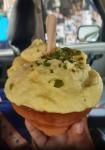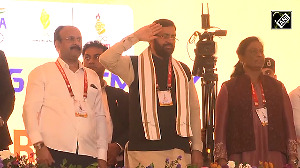
Barely had the catamaran touched the sand that Jaykudi jumped out and sped off with the white plastic bag. Three fishermen tried catching up with him but gave up seeing him disappear into his hut.
"He could have given us two, three. One at least," they said converging listlessly on the concrete road that ran up to the sand. Had Jaykudi shared the spoils, it would have made for a sumptuous meal tonight. Habituated to a daily meal of fish, the fisherfolk of Talaguda missed their staple fare. It had been more than a month that they had fished. No one better than them knew that no meal was worth its salt without fish.
Talaguda is a fishing village with a stunning view of the sea. Fifteen hundred people live here in 600 homes just a few metres from the shore, where aquamarine waves caress white sands and a cluster of tall coconut trees gently sway in the wind. It is quiet, pristine and breathtaking.
When the tsunami came, it took 37 lives, destroyed 80 homes and bent the coconut trees. Those who survived spend their days talking about the sea, their lost or damaged boats or when they would begin fishing again. They sit down on the cool sand under those trees and sometimes talk for hours. After the waters destroyed their livelihood, there isn't much left for them to do. Even the sole cable television connection had snapped.
"We sit here by the sea through the day. For the first time in our lives, we haven't fished for such a long time. Even our bodies are getting stiff," says Raghu.
In better days, the only time a fisherman missed going to sea was when there was a death in the family -- "Only on the day of cremation, otherwise we go regularly," points out Lal Mani, who did not even know that a tsunami had struck till he returned ashore at 6.30pm on December 26.
 Today was the first day Jaykudi, Shailendran and Sugumurthy had gone to sea. They left at 11 am to sample the fish and returned at 1pm, gathering a paltry catch worth between Rs 50 and Rs 100. "There are only one-tenth of the fish now and what we found was very small sized fish. We don't know when we will go fishing again," said Jaykudi.
Today was the first day Jaykudi, Shailendran and Sugumurthy had gone to sea. They left at 11 am to sample the fish and returned at 1pm, gathering a paltry catch worth between Rs 50 and Rs 100. "There are only one-tenth of the fish now and what we found was very small sized fish. We don't know when we will go fishing again," said Jaykudi.
Used to selling 40 per cent of their catch to wholesalers, the fishermen had commanded a good price before the tsunami -- Rs 250 to Rs 300 per kg for prawns, Rs 150 per kg for crabs, Rs 40 to 120 per kg for fish. In their village, fishermen who had their own boats made around Rs 10,000 per month, catamaran (small boat made of three wooden planks) owners made Rs 7,000 and labourers on the big boats made Rs 3,000.
But all had changed since. Of the 75 boats in their village, 35 were completely destroyed and many were damaged. 220 of the 600 fishermen had received the government disbursed compensation for fishing nets, boats by the end of January while small boat repairs had been undertaken by the Aditya Birla Group.
"Fisherman have begun fishing in four places," says Cuddalore District Collector Gangandeep Singh Bedi, "We want fish to be marketed so we have arranged for the state fisheries people to go and buy fish directly from fisherman in the village."
Nagapattinam copes with tsunami aftermath
To dispel people's notion that the fish had not been poisoned after the tsunami and safe for consumption, Bedi had sat down at a fishing village and eaten fish a few days back. His gesture had reinstated faith in some hearts but the fishfolk of Talaguda said they were still scared of the sea.
"We haven't started going back because the boat compensation that we have received is not enough and we are fearful of the sea," they say. With no savings, the fishermen point out that it would cost them Rs 1 lakh 75,000 to get a vallam (small boat made of fibre) with engine and nets, moreover they required the re-installation of fishing infrastructure to begin fishing regularly.
"We expect the government to help us for the next couple of months because it will take us a minimum of two months to mentally recover from the tragedy," says Raghu.
 Attributing their survival to the coconut trees that broke the speed of the tsunami waves, the fishermen say that though they have spent their whole life living off the sea, they couldn't dispel the fear within. These were seasoned men of the sea who had spent up to 5 to 9 hours everyday in those very waters their whole lives but the fury of the water had left them terribly shaken.
Attributing their survival to the coconut trees that broke the speed of the tsunami waves, the fishermen say that though they have spent their whole life living off the sea, they couldn't dispel the fear within. These were seasoned men of the sea who had spent up to 5 to 9 hours everyday in those very waters their whole lives but the fury of the water had left them terribly shaken.
"Individually, we are not scared but collectively we are," they say. "Once we get our boats, engines, nets and make at least ten trips into the sea, we will become normal."
Till then, the fishermen of Talaguda do other important things like waiting for World Vision to bring a fresh consignment of aid since the government dole was long over. Today, they had caught some fish. And inspite of running away with the bag, Jaykudi had later come out of his three room hut to distribute the meager catch.
That evening Jayakudi's family did not eat any fish. The generous man hadn't kept any for himself.
Photographs: Paresh Gandhi/India Abroad
Image: Uday Kuckian





